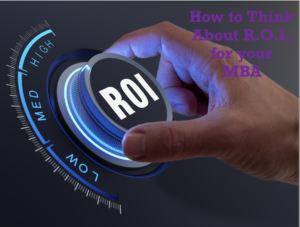
In a recent discussion I had with Andrea Flores from IE University in Madrid, we talked about the Return on Investment of an MBA. It was a fantastic discussion that allowed us to explore ROI as a broad concept, but I did receive some messages from listeners asking me for a “sample formula” for calculating ROI. So, I decided to oblige.
That said, before I lay this out, I want to stress that there are a range of intangibles that every applicant must take into account, and thus this formula should be just one factor of many. For instance, what value do you place on moving into a career that you find more fulfilling or meaningful, even if the boost in salary isn’t necessarily a positive ROI? On the other hand, using this approach will at least allow you to see what choosing a particular field (or, to put a point on it, choosing happiness) will cost you monetarily.
So, for the 1% of MBA applicants who don’t know, ROI is a statistic used in finance to gauge how profitable an investment is. Calculating the ROI in the context of an MBA can assist prospective students in determining if getting an MBA degree is a wise financial move.
Here are the variables you must take the following into account when calculating the return on investment for an MBA:
- Tuition costs: Depending on the university and program, an MBA degree might be expensive. The majority of MBA programs cost $40,001 to $100,000.
- Opportunity cost: Earning an MBA entails a large time commitment, usually two years of full-time study. This implies that during this period, pupils will have to pass up possibilities like working or continuing their studies. The potential money that a student may have made while in the program is the opportunity cost of an MBA.
- Financial assistance: A lot of MBA schools provide financial assistance in the form of loans, grants, and scholarships. When estimating the return on investment of an MBA, it’s crucial to take them into account since they may help offset the cost of tuition and living expenses.
- Salary boost: Increasing one’s earning potential is one of the main motivations for acquiring an MBA. Many MBA graduates get a large raise in pay after finishing the program. To estimate the possible financial advantages of an MBA, this rise should be considered when calculating ROI.
After taking these things into account, do the following:
- Calculate the MBA program’s overall cost. This should include living costs, tuition fees, and any additional expenditures related to completing the degree. Most MBA programs will have sample budgets and also give a simple “full cost of attendance” for students. Public institutions will break it down by in-state, out-of-state, and international students, as well as by type of program (part-time, full-time, etc.)
- Calculate the MBA’s opportunity cost. This represents the potential earnings the student may have made while enrolled in the program had they not been pursuing an MBA.
- To calculate the net cost of the MBA program, deduct any financial help obtained from the total cost.
- Calculate the income boost the student may anticipate receiving once they have finished the MBA program.
- To calculate the ROI, divide the anticipated income gain by the net cost of the MBA program. The ROI, for instance, would be 33.33% if the net cost of the MBA was $60,000 and the anticipated wage gain was $20,000 per year.
It’s crucial to keep in mind that the ROI for an MBA might change based on the student and the exact school they select. After earning an MBA, some students could have a greater wage boost while others would not. The price of an MBA program might also change based on the school and the particular program. Therefore, while calculating the ROI of an MBA, it’s crucial for prospective students to carefully analyze these elements and perform their own computations.
Again, I think that this is very useful data in terms of figuring out whether it makes financial sense, BUT as our podcast conversation makes clear, you’re not a “homo economicus” that makes decisions purely on salary and financial outcome. Use this data point as one of many to determine whether an MBA is for you!
For more help with your personal statement, check us out at Gurufi.com. Our personal statement editors and consultants have decades of experience helping clients get into top MBA programs. Our specialty is helping you craft compelling personal statements that move the needle in your admissions process! For questions, shoot us an email at service@gurufi.com. Check us out on Facebook, Twitter, and LinkedIn.
